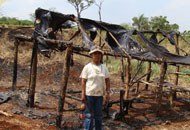Damiana, a Guaraní-Kaiowá and religious leader in the Apyka'y at the shell of a torched hut after people were forced out by hired Shell thugs
By David Vollrath at Rainforest Rescue
A big partial win for Indians in Brazil: A court has again stopped the Belo Monte mega-dam. Other successes in recent days: In Bolivia Indians have achieved that construction of a road through the TIPNIS national park was stopped. And in Cameroon a court stopped species rich tropical forest from being clear-felled for oil palm plantations.
We’re over the moon with joy. Rainforest Rescue has so far collected more than 60,000 protest signatures against Belo Monte. But the struggle continues because the projects haven’t been stopped for good.
Please now also help the Guaraní Indians in the Brazilian state Mato Grosso do Sul with their desperate struggle against the Shell oil company.
Their situation is desperate. Shell is turning Guaraní land into sugar cane plantations for ethanol for Europe. An incident last week shows the brutality of the Shell henchmen. They attacked two Indian settlements, injured men and drove out children and women.
“45,000 Guarani suffer extreme social exclusion there,” says a prominent Brazilian environment activist and politician, Marina Silva. Click here to add your protest.
Back to Belo Monte.
The court handed down its judgment on 29 September. The complaint by a fishing association from Altamira (Acepoat) was ruled valid in the justice ministry of Belém and building work on the Belo Monte hydropower station was ordered to stop immediately.
The ruling by judge Carlos Eduardo Castro Martin forbids the owners of the project, Norte Energia S.A (NESA) from making any changes in the river bed of the Xingu. His decision places the interests of the people who live from fishing along the river above the economic interests of the Brazilian state.
In the Xingu live 372 species of fish which form the basis of livelihood for thousands of people. Many of these species would not survive the building of Belo Monte.
Other negative environmental impacts threaten. Of the 40 stipulated environmental impositions, only a fraction has been implemented. Moreover, 20,000 people would be driven from their homes by the dam. Among the protesters are 20 scientific societies.
The Belo Monte project stands for heated social contention in Brazil whether economic interests are more important than nature and culture.
Along the Xingu River live especially many indigenous groups, including some not yet contacted, whose cultural survival is massively threatened by the electricity producing dam.
On its website Rainforest Rescue reports more successful outcomes of protests this year in Indonesia, Cambodia, Laos, Papua New Guinea, South Sudan El Salvador, Paraguay, Ecuador, Costa Rica, Honduras, Germany and the EU.


Comments
In Bolivia, the road construction is still ongoing...
You got it a bit wrong: In Bolivia the president said that the road construction is suspended, but the ABC (Bolivian Roads Authority) never gave the order to stop the construction of the TIPNIS road and the construction is currently ongoing.
The march of the native people to La Paz is to be restarted as soon as they regroup following the government mandated assault on them and the government keeps churning proposals and strategies to validate and justify the construction of the road.
Apparently, for the president of Bolivia, the construction of the road is a matter of life or death due to an obscure deal that the official party has with the Brazilian construction company OAS.
There is too much misinformation and secrecy from the socialist government and the final outcome is still far from clear.
Brazilian Indian killed and abandoned by ‘ranchers’ gunmen’
September 30, 2011
A Guarani man in his 20s has died of his wounds following a violent attack, allegedly by gunmen employed by Brazilian cattle ranchers.
Teodoro Ricardi was left fatally injured, and died at the side of a road in the central-western state of Mato Grosso do Sul on Tuesday.
He had been stabbed seven times and his body was covered with bruises.
The attack occurred close to the São Luiz ranch, from where two Guarani witnesses say they saw men running into the forest after the incident.
The ranch occupies the Guarani’s ancestral land. Teodoro’s community, Y’poi, has been besieged since it reoccupied part of its land in 2010.
The Guarani are trapped by the ranchers, who are restricting the Indians’ access to medical care.
A Guarani from Y’poi told Survival International, ‘We are being persecuted. We are treated like animals, killed and thrown on the streets.’
The Guarani of Mato Grosso do Sul, who are desperately trying to recover a fraction of their original territories, face bitter and violent resistance from wealthy ranchers and soya and sugar cane plantation owners.
Survival’s Director Stephen Corry said today, ‘The Guarani have suffered enough without Teodoro’s murder adding to their grief. His death, like those before him, could have been prevented if the Brazilian government had allowed the Guarani to live on land that is in fact rightfully theirs.’
In 2009 UN High Commissioner for Human Rights Navi Pillay displayed her shock at the Guarani struggle, by describing the tribe as ‘astonishingly invisible.’
Source posting of this story: http://www.survivalinternational.org/news/7752
Like our squattocracy
Reminds me of what squatters did to Aborigines not that long ago. Coniston massacre 1928.